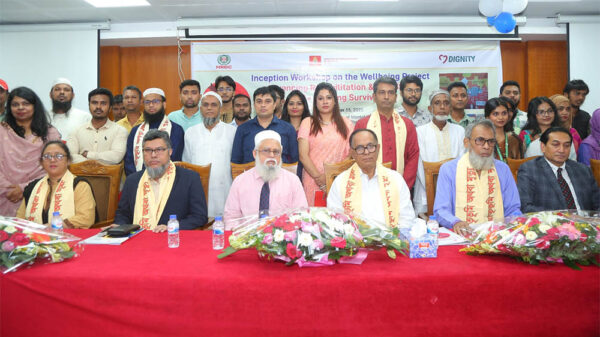

Staff Reporter, Dhaka : The Human Rights Development Centre (HRDC) organized the Inception Workshop of the Wellbeing Project for July Uprising Survivors at the National Institute of Mental Health and Hospital (NIMH), Dhaka, in collaboration with DIGNITY – Danish Institute Against Torture, with financial support from the Ministry of Foreign Affairs of Denmark (DANIDA). The workshop aimed to strengthen rehabilitation and Mental Health and Psychosocial Support Services (MHPSS) for survivors of the July 2024 Uprising and their families.
The event commenced with an inaugural address by Mahbubur Rahman Bashir, father of martyr Mahmudur Rahman Shoikot, who emphasized the responsibility of HRDC to stand beside the traumatized July Uprising survivors.
Md. Mahbul Haque, Secretary General & CEO of HRDC, delivered the welcome speech and Md Jianur Kabir, Director at HRDC, presented data on the mental health consequences of the uprising.
Special Guest Mr. Anders Karlsen, Deputy Head of Mission, Embassy of Denmark, reaffirmed Denmark’s commitment to supporting MHPSS and rehabilitation programs for conflict-affected individuals in Bangladesh and expressed his pride for the partnership with Bangladesh in the terms of democracy, healing and development.
Chief Guest Md. Saidur Rahman, Secretary, Ministry of Health and Family Welfare, emphasized the importance of institutional coordination and underscored the need for joint collaboration among government agencies, employment bank, NGOs, and other stakeholders to ensure sustainable survivor support, both in terms of economic empowerment and mental health care, as these two aspects are deeply interconnected.
Prof. Dr. Md Abu Jafor, Director General, Directorate General of Health Services (DGHS), stated that 40 July Uprising survivors have been sent abroad for advanced medical treatment with the assistance of the National Institute of Ophthalmology and Hospital (NIOH) and NITOR, and he commended HRDC’s initiative for supporting the July survivors.
Lt. Colonel (Retd.) Kamal Akbar, CEO of the July Shaheed Smriti Foundation, mentioned that although the foundation has been working with a limited number of survivors, it is essential to ensure rehabilitation and recovery for 12,454 survivors suffering from depression, acknowledging that this is not an easy task. He emphasized the need to conduct research to identify the root causes of their challenges and design effective interventions.
Shamsi Ara Zaman, General Secretary of the July Shaheed Smrity Foundation and mother of martyred journalist Tahir Zaman Priyo, shared that even before joining the foundation, emphasized that individuals with mental health conditions should not be stigmatized as insane. She also highlighted the importance of collaboration between HRDC and the Foundation to ensure sustained support for survivors.
July Uprising survivors shared their lived experiences, urging for continued rehabilitation, inclusion, and dignity. The workshop included a rich discussion with representatives from civil society, NGOs, and government agencies, including Jena Derakhshani Hamadani (iccbr,d), Sumaiya Tasnim (SOCCHAR), Farhad Hossain (LEEDO), Md. Masud Rana Sourav (July Joddha Sangsad), Aminur Rasul (PHM), Md. Anwar Hossain (Director & Joint Secretary, NGO Affairs Bureau). They discussed strategies for rights-based, survivor-centered rehabilitation, psychosocial support, and long-term care.
Chaired by Prof. Dr. Md. Mahbubur Rahman, Director of NIMH, the workshop successfully laid the foundation for the Wellbeing Project, ensuring a collaborative approach to address the psychological, social, and rehabilitative needs of all July Uprising survivors in Bangladesh.